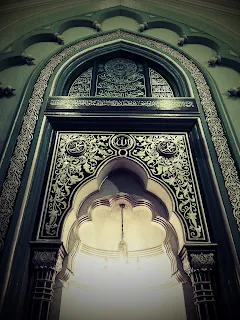Qur’anic Commandments- 5
 Do you not see that all those who are in the heavens and the earth praise God, as do the birds with wings outstretched? Each knows his own mode of prayer and glorification: Allah has full knowledge of all that they do. To Allah belongs the kingdom of the heavens and the earth, and to Allah shall all things return. (24:42)
Do you not see that all those who are in the heavens and the earth praise God, as do the birds with wings outstretched? Each knows his own mode of prayer and glorification: Allah has full knowledge of all that they do. To Allah belongs the kingdom of the heavens and the earth, and to Allah shall all things return. (24:42)
Say,
‘My Prayer and my sacrifice and my life and my death are all for
Allah, the Lord of the worlds. (6:163)
Worship of the Divine through observance
of Prayer is among the primary markers of faith in Islam. Like all religions that prescribed certain rites of sacrifice and soulful worship in their
tenets, Islam validates the significance of formal prayer in the quest for Divine countenance and communion through the teachings
and practice of the Holy Prophet Muhammad (sa). The Holy Qur’an contains clear commandments
on formal Prayer (al-Salat) to be
performed at specified times every day, as exemplified in the Prophetic
traditions. Beyond the prescribed formal Prayer at five times a day, the Qur’an
also contains illuminating guidance on supererogatory prayers (Tahajjud); Divine remembrance (Zikrullah), supplications and other invocations
(Duah) in the solitude of the
worshipper.
Designed to protect people from the impurity of evil impulses, and to elevate the human souls to a station of Divine consciousness in their everyday affairs, the cycle of Prayer offers a sense of perspective on the higher truths and priorities of life, and the vital duty to seize our moment in worshipful service of God in this fleeting world. Indeed, true Muslims are people who are devoted to the Prayers; those who remain constant and steadfast in their Prayers. Reproduced below are certain Qur’anic prescriptions on Salat- including on the supererogatory Tahajjud prayers offered by true devotees in the stillness of the night in the quest for Divine grace and pleasure:
‘O my dear son! observe Prayer, and enjoin good, and forbid evil, and endure patiently whatever may befall you. Surely, this is a matter of high resolve. (31:18)





